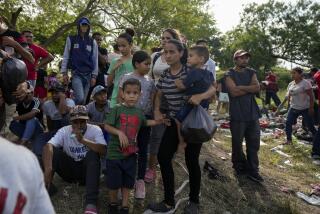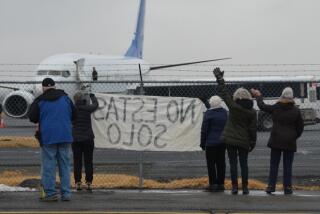Cuba Complained to U.S. About Flights, Havana Says
HAVANA â In the 20 months before Cuban jet fighters shot down two airplanes piloted by members of an exile group, officials of Fidel Castroâs government had formally complained four times to their U.S. counterparts that the organization was routinely invading Cubaâs airspace, a Foreign Relations Ministry official said Wednesday.
U.S. authorities appeared to have been acting on the complaints but too slowly to satisfy Cuban concerns about what they perceived as the increasing frequency and aggressiveness of the flights, including anti-Castro leaflet drops over Havana, Cuban authorities said.
âWe were left to the conclusion that they were not taking the measures necessary to stop the flights,â said Rafael Dausa, an official with the U.S.-Canada Department of the Foreign Relations Ministry.
Since May 1994, planes from the exile organization Brothers to the Rescue have invaded Cuban airspace 26 times, he said.
âWe have shown great patience,â he said. âThis can be seen from the number of flights by these pirates.â
Saturday, Cuban authorities lost patience, they have insisted, and shot down two Cessnas belonging to the organization. The four men aboard are believed dead.
International condemnation of Cuban actions in shooting down the planes has given the regime here a new rallying point.
During a well-orchestrated demonstration at the military academy on Wednesday, cadets and instructors recited poetry and gave speeches comparing the current situation to the 1961 Cuban Missile Crisis, when President John F. Kennedy forced what was then the Soviet Union to remove its atomic missiles from Cuba.
Cubans consider the actions of Brothers to the Rescue and the international disapproval that followed the shoot-down of the planes as another chapter in more than three decades of infringement on their sovereignty.
Earlier tensions over the alleged entries into Cuban territory reached a high point on July 13, when Brothers to the Rescue founder Jose Basulto flew over Havana dropping anti-Communist leaflets.
The following day, Cuban authorities threatened to shoot any planes that entered their airspace.
They also provided requested information when the Federal Aviation Administration began disciplinary action against Basulto in August to revoke his pilotâs license for violating Cuban airspace. He has appealed the disciplinary action.
However, the measures against Basulto did not discourage his organization. Brothers to the Rescue illegally entered Cuban airspace twice last month to drop leaflets, witnesses here said.
After the second incident, the Cuban weekly newspaper Workers reported that the Cuban government sent a formal diplomatic note to the United States on Jan. 16 protesting the flights.
Brothers to the Rescue plans to drop memorial flowers Saturday on the area where the planes were shot down, Basulto has said. The Cubans claim that the area is inside their territorial limits, but the United States government has said it is in international waters.
Meanwhile in Washington, the Clinton administration groped for ways to discourage Basultoâs group from going ahead with its plans.
White House Press Secretary Mike McCurry said the administration has warned Basulto repeatedly about the dangers of taunting Castroâs government with the flights.
A spokesman for the FAA confirmed that the organization is investigating recent flights by Brothers to the Rescue to determine if there are grounds for revoking the pilotâs licenses of the groupâs fliers.
If the administration blocks Basultoâs plans, that would be a tacit acknowledgment that the group did something wrong last weekend, undercutting Washingtonâs claim that the downing of the two planes was unjustified.
Times staff writer Norman Kempster in Washington contributed to this report.
More to Read
Sign up for Essential California
The most important California stories and recommendations in your inbox every morning.
You may occasionally receive promotional content from the Los Angeles Times.










